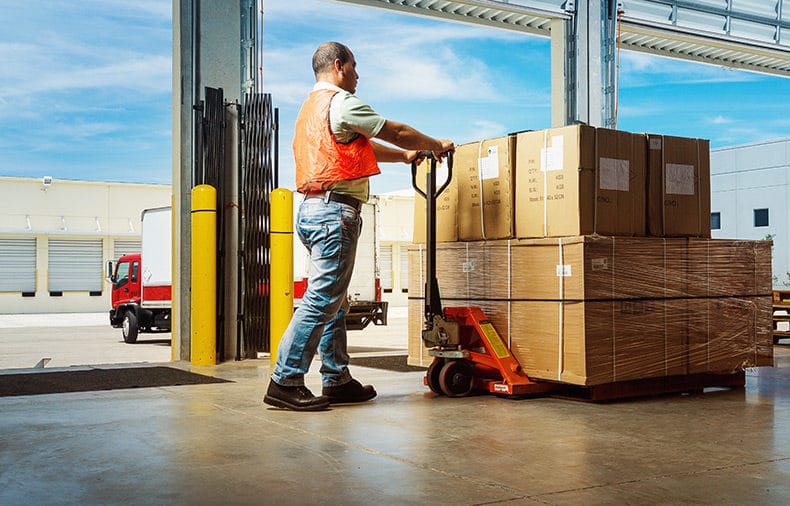WHAT DOES FOB MEAN IN SHIPPING?
FOB means “free on board” or “freight on board.” It indicates when liability and ownership of shipped goods are transferred from a seller to the buyer. In other words, FOB shows who pays for shipping and when a supplier is no longer financially responsible nor liable for damages to or loss of shipped goods.
FREE ON BOARD VS. FREIGHT ON BOARD
Free On Board
Free on board (FOB) indicates whether the shipper or buyer is responsible and liable for damaged goods during transport. The designation determines which party is responsible for freight charges and at what point the shipment passes from the seller to the buyer.
For example, in international shipping, FOB [origination port] would mean that that the seller would be responsible for the cost of transporting and unloading the goods to the port of origin. The buyer would be responsible for the cost of insurance, ocean freight transport, unloading, and transporting the goods to their final destination from the arrival port.
Freight on Board
While free on board is the official term used when referencing FOB, it’s commonly referred to as “freight on board” and holds the same meaning. It doesn’t matter which term you use. What’s important is that you understand what FOB actually means.
FOB MEANING EXPLAINED
FOB simply indicates whether the buyer or seller is responsible for goods that are damaged, destroyed, or lost during shipping.
For example, let’s say Carl’s Computers of Texas purchased a pallet of new computers from Computers Direct in China. After receiving the freight, the manager of Carl’s Computers unpacked the machines and noticed that the monitors were broken. The manager then looked at the bill of lading to review the agreed-upon FOB terms. That is, the manager looked to see who would be paying for the damage.
Deducing who is liable for the damaged computers relies on the FOB terms stated on the bill of lading. The manager of Carl’s Computers was able to find out that the FOB terms were as follows: “place of origin, freight prepaid.”
TYPES OF FOB USED ON SHIPPING DOCUMENTS
FOB is used in four different ways. To fully grasp the concept, it’s important first to understand the difference between place of origin vs. place of destination and freight collect vs. freight prepaid.
place of origin vs. place of destination
Place of origin is when the buyer assumes ownership of the shipment as soon as the carrier picks it up and the bill of lading has been signed off on. On the other hand, place of destination assumes the seller owns and controls the goods until they have been delivered. Both place of origin and place of destination denote who actually takes responsibility for the freight at any given point in time. Next, let’s look at collect vs. prepaid.
freight collect vs. freight prepaid
Freight collect simply means that the receiver of the freight is liable for all freight charges. Freight collect also assumes that the receiver is responsible for handling damage and loss claims. In contrast, freight prepaid is when the shipper or seller pays all shipping costs, including damage and loss expenses.
Now that you understand the various FOB terms, let’s put it all together. The following are different ways FOB is used in shipping.
FOB [PLACE OF ORIGIN], FREIGHT COLLECT
FOB [Plave of Origin], Freight collect assumes that the buyer:
- Pays all freight charges
- Bears freight charges
- Owns the goods in transit
- Files claims
FOB [PLACE OF ORIGIN], FREIGHT PREPAID
FOB origin, freight prepaid assumes the following:
- Seller pays all freight charges
- Seller bears all freight charges
- Buyer owns goods while in transit
- Buyer files claims
FOB [PLACE OF DESTINATION], FREIGHT COLLECT
FOB destination, freight collect goes as follows:
- Buyer pays freight charges
- Buyer bears freight charges
- Seller owns goods in transit
- Seller files any claims
FOB [PLACE OF DESTINATION], FREIGHT PREPAID
FOB place of destination, freight prepaid states that the seller is responsible for:
- Paying all freight charges
- Bearing freight charges
- Owning goods in transit
- Filing insurance claims
WHY YOU SHOULD CARE ABOUT FOB
It’s common practice for the receiver of a shipment to refuse delivery if damages are visually present. As a result, things tend to get messy when it comes to assigning blame. Having said that, buyers and sellers should take the time to study and understand FOB designations to avoid any problems.
uShip LTL Transport Services
By now, you should know what the actual FOB meaning is. If you still have questions about FOB, uShip can help. With uShip, you save money, time, and eliminate stress. Get low rates from top carriers, free rebill audits, national and regional coverage, and much more.
Shipping LTL Freight?
Get Quotes NowRelated Articles

FBA stands for “Fulfillment by Amazon.” Specifically, FBA is a service provided by Amazon to assist sellers on the platform. The service includes storage, packaging, and shipping assistance to sellers.

Measuring freight is often confusing for beginners. If you do not know how to measure your freight properly, you run the risk of paying additional fees after delivery.

A bill of lading, or BOL for short, is a transport document that is required for shipping freight. A BOL can be defined as a receipt for services rendered during a freight shipment.